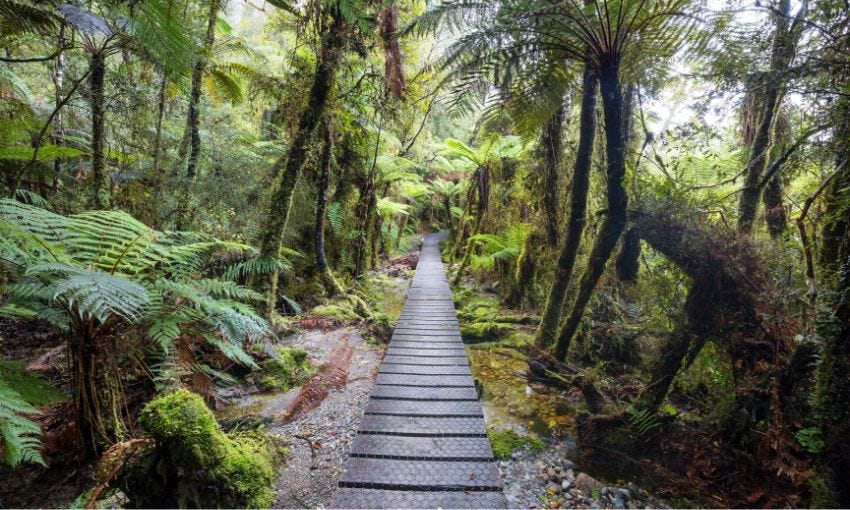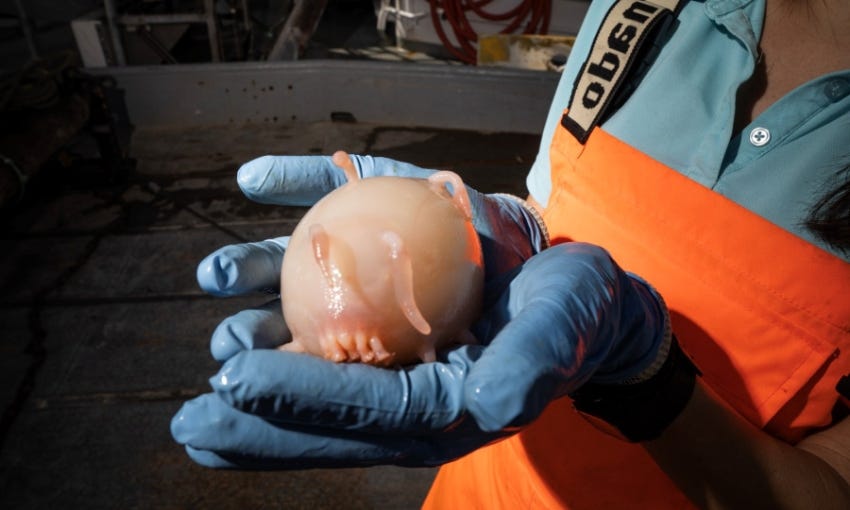‘The worst piece of law proposed since 1979’: Reactions to the Fast-track Approvals Bill
A round-up of submissions on the controversial proposed law.
Kia ora, welcome to Future Proof.
Thanks for joining me. This week: Earth Day, the cost of climate change, and 100 new ocean species. But first: what has everyone said about the Fast-track Approvals Bill?
Last week, submissions on the controversial Fast-track Approvals Bill closed just hours after the government released a list of stakeholder organisations who were sent letters advising how they could apply for the fast track. The Bill aims to create a “one-stop shop” for green-lighting infrastructure and development projects of national or regional significance, but it has faced fierce criticism for sidelining environmental concerns, concentrating decision-making power in the hands of three ministers, and potentially breaching Treaty rights.
Here’s what different groups and officials have said about the bill in the last week.
The government watchdogs
Parliamentary commissioner for the environment Simon Upton released a meaty submission recommending eight changes to the proposed new law, including removing the role of ministers as the final decision-makers. Upton said the bill posed “significant risks to the environment”, comparing it to the Muldoon government’s similar – and deeply unpopular – legislation: “Even the much-maligned National Development Act 1979 had more environmental checks and balances.” Upton didn’t hold back, writing that the bill would “achieve sub-optimal outcomes through poor decision-making, poor allocation of resources, a lack of legislative durability, and increased litigation risk.” Another independent government official, auditor-general John Ryan, weighed in too, suggesting that measures to manage conflicts of interest be beefed up and that ministers should publish the reasoning for their decisions. “Power comes, in my view, with an obligation to be transparent to the public,” Ryan wrote.
The expert researchers
The fast-track process is “more about getting bad things done in a potentially dangerous way,” write two law professors in The Guardian. Margaret Stanley, a professor of ecology, outlined five ways the bill threatens nature, writing that it “risks eroding the country’s already fragile natural capital.” Prominent anthropologist Dame Anne Salmond published her biting submission on Newsroom: “No MP who believes in democracy can support this bill and stay true to their values,” she said, while also expressing concern that the ministers are acting as if the bill has already become law. “By behaving as though it has already been passed, the ministers are treating the democratic process with contempt.”
The business interests
The Sustainable Business Network, representing more than 500 businesses and other organisations, said the bill is “a significant, and possibly disastrous, downgrade in environmental oversight.” The network’s submission also noted that the bill would undermine long-term development, and could jeopardise international trade, with places like the European Union increasingly requiring proof of sustainability creds.
The environmental groups
The Environmental Defence Society (EDS), like Upton, drew comparisons to the 1980s era of unbridled power: “The Bill is the worst piece of law proposed since the National Development Act 1979 (although, as pointed out at various places above, the Bill is actually less environmentally and constitutionally sound than that Act in many places).” Three environmental groups – EDS, Forest & Bird and WWF – picked up on an inconsistency in wording which could open up national parks to mining. When the Key government proposed something similar in 2010, it was met with fierce opposition and a 40,000-strong march down Queen Street.
The Fast-track Approvals Bill is now being considered by the Environment Select Committee. The committee’s report is due 7 September 2024.
How you can stay informed the year the world votes
Two billion voters are set to go to the polls in 64 countries this year. One of the perks of being a Spinoff member is receiving The World Bulletin, a weekly newsletter rounding up global news. Edited by Catherine McGregor, it’s sent to members every Thursday. Becoming a member means you’ll not only help sustain local journalism but stay on top of consequential world news, see less advertising, be able to comment on the Spinoff and more. Join today.
Climate inaction will dent global economy by $38 trillion
By mid-century, climate change will shrink global income by 19%, a new study has found. That’s equivalent to a dent of $38 trillion every year by 2049 (or, as Bill McKibben points out, about 150 Jeff Bezoses). The analysis considered rising temperatures up to 3°C warmer, and changing rainfall, but not the cost of extreme weather events. It compared to a baseline without the effects of climate change, but also found that limiting warming to 1.5°C would reduce losses by two-thirds.
New Zealand’s emissions continue to drop
Emissions of planet-heating gases have declined for three years up to 2022, according to the latest figures, with the most recent drop the biggest since climate action efforts began. The decrease was largely driven by less coal and gas being burned to generate electricity, thanks to plenty of rain keeping hydro dams full. But as Newsroom’s Marc Daalder points out, this pace of change could well end up slowing as the new government’s reversal of climate policies takes effect.
The radical origins of Earth Day
This past Monday was Earth Day. The theme was “Planet vs. Plastics”, coinciding with negotiations for a global plastics treaty underway this week in Canada. You might have only noticed the occasion via a social media post or marketing email, but the very first Earth Day in 1970 saw 20 million people across the US participate in a day of protest. Now, Earth Day is “a day of corporate greenwashing,” says Outside. The magazine spoke to three climate activists about how the holiday could go back to its activist roots. President Biden marked Earth Day by announcing a $7 billion investment in a “solar for all” programme.
More stories
Climate activists are targeting cruise ships across Aotearoa. Shanti Mathias finds out why.
The waste generated from period products is small fry compared to the environmental impact of big corporations, argues Kristin Kelly.
With large parks and a number of well-maintained cycleways, biking on Auckland’s North Shore just makes sense.
The company that turns recycled soft plastic into fence posts has been dumping “truckloads” of plastic into landfill, an investigation by The Post’s Andrea Vance reveals.
Big beauty brands are greenwashing with eco claims that don’t stack up, says Consumer NZ.
Embroidery is making a comeback, as Gen Z uses the medium to upcycle clothes and push back against fast fashion.
The Grand Imam of South East Asia’s largest mosque has directed a river clean-up and retrofitted the mosque with solar panels and a recycled water system. Can “green Islam” drive change in Indonesia?
On the Solomon Islands, tribes are banding together to sell “high integrity” carbon credits – preserving their biodiverse rainforests and funnelling income to Indigenous landowners.
She’s kind of a pig deal. Image credit: Rebekah Parsons King/NIWA (CC BY-NC-ND 4.0).
To finish this issue, please enjoy this fantastical creature fished up during a NIWA expedition to the Bounty Trough. “While she may look like a Pokemon or a demented steamed bun, she is in fact a type of sea cucumber, known as a sea pig,” writes Gabi Lardies in a round-up of some of the 100 new deep-sea species discovered.
Why not make some discoveries of your own this weekend: the City Nature Challenge kicks off on Friday. Cities from around the world compete to see who can catalogue the most biodiversity over four days. Snap some photos of your backyard critters and you might even make a new discovery.
Happy as a sea-pig in marine mud,
Ellen
Future Proof is looking for a sponsor!
Connect your brand with an insightful exploration of environmental news, reaching influential readers committed to sustainability and staying informed about the state of our natural world. Contact commercial@thespinoff.co.nz to learn more.
Got some feedback about Future Proof or topics you’d like covered? Get in touch with me at futureproof@thespinoff.co.nz













